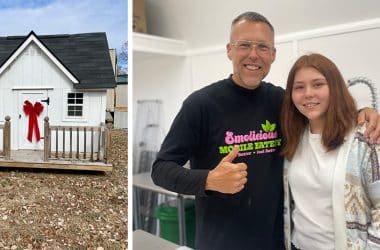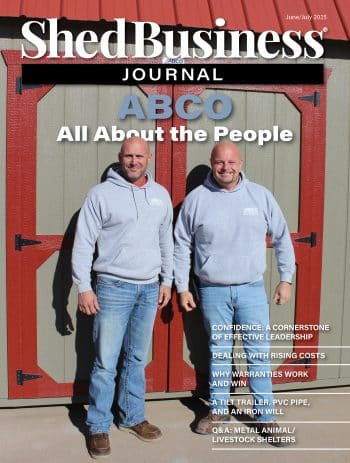
According to the U.S. Department of Agriculture, there were just over 2 million farms nationwide in 2022.
That translates into roughly 1.6 billion farm animals being raised in the United States.
For Steve Fischer, president and owner of Fox Run Storage Sheds in Washington, New Jersey, selling animal shelters, also known as loafing sheds, along with his vast inventory of sheds was a no-brainer.
“I grew up raising chickens and had other animals in the home. Still do,” he says. “I love the fresh eggs they produce. Animals are interactive and I enjoy their antics. They are great for family bonding.”
According to his son, Sean, who heads marketing and serves as a “jack of all trades” for Fox Run, the company added horse barns and chicken coops due to customer requests in 2005.
Steve Fischer’s father started the family’s shed retailing company in 1991, making the entity a third-generation establishment. After Steve took over his dad’s inventory in 2005, the idea to add animal shelters took flight.
Today, animal shelter sales account for approximately one-third of Fox Run Shed’s revenue.
The company is headquartered near Somerset, New Jersey, which Steve describes as a “big horse area. The need for horse shelters is consistent.”
Among the animal shelters available at Fox Run are horse barns, dog houses, and rabbit hutches. It also stocks chicken coops whose styles were changed because the pandemic caused prices to soar due to their popularity.
“We changed manufacturers, and their style was different” than our original partner, says Sean.
Customers with other animals might also be able to find the “loafing shed” of their dreams at Fox Run. According to Sean, Fox Run can convert normal sheds into whatever a client wants, even if it’s to house alpacas, goats, or donkeys.
“We’ve done it before and if a customer wants it, we will customize to their requests,” he says.
Sean recalls one customer who had a “bear issue.” The patron owned goats that attracted bears.
To ensure the safety of the goats, Fox Run customized an 8 by 8 goat shed featuring a caged run area, which allowed the animals to be outside within the cozy and safe confines of reinforced fencing.
The run also had a roof, so the area was protected from weather, as well as unwelcome predators.
Animals are so beloved in the Fischer family that Steve displays animal shelters and other products twice every summer at two different 4-H fairs in New Jersey.
“It’s great advertising, good exposure, and a lot of fun,” he says.
Over the years, he has brought his own chickens and a rooster to the fairs, giving guests an immediate appreciation for the need for proper animal housing.
ANIMAL SHEDS IN AMISH COUNTRY
When Jeremy Ganse, an owner of Lancaster County Barns, opened his business in 1999, equine products such as horse barns were part of the inventory.
However, approximately six years later, he noticed customers were requesting smaller structures for family pets, so dog houses and rabbit hutches were added to the mix.
“Smaller animal housing is a growing market,” he says. “Equine barns are a luxury. Customers wanted smaller structures that are easier to maintain and less expensive.”
From a practical standpoint, there is a larger market of clients seeking smaller houses for family pets than there are people who purchase equine barns.
“If a municipality allows residents to have chickens, they need a way to house them,” Ganse points out.
While planning and building housing for domestic and farm animals accounts for approximately one-fourth of Lancaster County Barn’s revenue, Ganse says he finds it extremely worthwhile.
“We’re helping people solve problems and enjoy the solutions by providing a good, safe home for animals,” he shares.
Storage sheds, says Ganse, tend to be about “where do we put our stuff?” However, what Ganse enjoys most about working with clients purchasing animal shelters is that it is for a “living creature. We like to help our customers care for their livestock and pets.”
In its 24 years of existence, Ganse says the most unusual animal housing his company ever built was an outdoor structure for 30 house cats.
Everything sold by Lancaster County Barns is conceived, planned, and built by its team, says Ganse.
“Beyond our construction quality, it’s our process” with clients that differentiates his entity from competitors, he says. “Our approach to understanding a client’s needs and meeting their budget” is at the center of all they do, says Ganse.
None of the Lancaster County Barn’s structures can be purchased by an RTO agreement, although credit cards are accepted for full payment.
“We stay with a more affluent clientele who can afford our products outright,” he says.
While his company will work with customers who finance their purchases, the client must secure financing on their own.
ANIMAL HOUSES IN THE BADGER STATE
Martin Sauder’s father started building storage sheds in 1975.
But it wasn’t until Martin and his wife moved to Wisconsin in 2001, taking the business with them, that animal shelters were added to the inventory.
“There are a lot of hobby farms in the Midwest that requested animal shelters,” he says. “We built them.”
He then realized the company’s inventory should include them regularly.
When it comes to animal shelters, Sauder Sheds’ biggest seller in the last few years has been chicken coops, says Sauder.
“When city homeowners were allowed to have chickens, we started building” appropriate housing for them, he says.
Without a doubt, the pandemic played a role in the company’s growth in chicken coop sales.
“Due to higher foods, people wanted their own products,” says Sauder. Many turned to chicken farming.
His company will deliver pre-assembled chicken coops within a 100-mile radius. While the first 50 miles are free, subsequent miles incur an additional charge.
“We deliver wherever the clients want us to go, and all expenses are included” in our delivery fee, he says.
Sauder’s loafing sheds can be customized to a client’s desires. The largest “and weirdest” animal shelter it erected was a $21,000 Ark playset made from poly.
In 2022, a client purchased one for her Westie dog to play on. It featured a ship Sauder erected from a kit purchased from an Ohio company along with sliding boards and rock walls.
When completed, the dog play park resembled a shipwreck. Sauder’s company delivered to the client’s private dog park.
Animal shelters built by Sauder include a pressure-treated frame. Its walls and roof are erected with 30-year metal.
According to Sauder, “Hobby farmers want buildings to match existing buildings and be maintenance-free. Also, horses can’t chew through because there is no exposed wood” for them to gnaw on.
Approximately 20 percent of Sauder’s revenue is generated by its animal shelter division, he says.
Sauder himself is an animal lover. “We have chickens in our chicken coop.”
Being an animal enthusiast himself, Sauder takes great joy in delivering animal housing to customers.
“Delivering animal shelters to hobby farms and hearing people talk about their hobbies and animals is great,” he says.
“It’s all about making their dream become a reality, and that is good to see.”
THE WILD WEST
Located in the grassland basin of Colorado known as South Park, Fairplay is home to a dealer outpost of The Shed Yard, headquartered in Penrose, Colorado.
Allen Fisher, The Shed Yard’s president, started the company in Montana in 2008.
When he relocated to The Centennial State in 2012, he brought the business with him. That’s when animal shelters were added to the company’s slate of products.
Fisher says he prefers to label animal shelters as “loafing sheds,” so customers won’t confuse them with pet rescues.
In addition to all manner of animal housing, The Shed Yard also constructs a Hi Wall Barn. It is taller than the standard shed and is available either with a floor or without.
“Any of our buildings can be built-to-order with the idea it may be used to house animals,” says Fisher.
He estimates between one-fourth to one-third of his company’s revenue is generated by building and selling animal housing, as well as structures customized to be utilized by animals.
Fisher enjoys selling loafing sheds because to him, “It’s more than a shed. It is for something people love. Their animals are like family members.
“Some customers have spent a lot of money to house their pets and we take that just as seriously as we do building a shed.”
Because The Shed Yard values community involvement, it gives back to its community.
For example, once a quarter, employees are encouraged to choose where they would like the entity to donate excess inventory.
“We have helped animal sanctuaries and donated shelters to churches and women’s shelters,” he says.
And, Fisher says, The Shed Yard’s loafing sheds are built tough.
“Our animal shelters are tanks,” he points out. “They are constructed like any of our other structures using 2 by 4 construction, 16-inch OC, and solidified with engineered trusses.”
Furthermore, horse barns are constructed with kick boards with metal bite guards in the corners so animals cannot kick out walls.
Its animal shelters are also reinforced with metal brackets with hooks in each corner so farmers can “drag them using a tractor.”
“As I get to interact with customers and get to hear stories about their animals, I get the sense that when a client buys an animal shelter, they are extremely cautious and want the best for their pets,” sums up Fisher.




